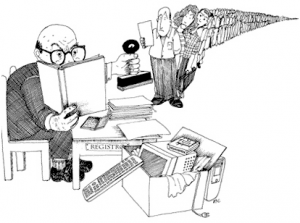This story I will tell here is autobiographic. It is something that strikes me each time I come in contact with a governmental body.
Let’s go to the beginning of August. It was a joyful moment for me: the birth of twins! And as a father I had of course to do my duty: the birth registration. It was not the first time I had to do this, so I was quite used to what to expect. But of course, this time it was for twins. So coming to the ticket window with the papers from the hospital and my passport, the lady in front of me starts with all the usual formalities. After a few minutes I was requested to fill in 3 pages with all kind of information about myself, my wife and my children. They ask my name, my address, my date of birth, my profession, etc. All this information they know already and they have stored somewhere in their many databases, but still I had to fill in this document manually! On top of that, I had to fill in the same document again for the second baby, where the only difference was of course the name I wanted to give to the baby and the time of birth. So this raised this question to me: is the Belgian government really so stupid they need to ask each time this information again? At that remarkable moment I was thinking to try something unexpected (I am a genuine tester so this is almost standard behavior for me). What if I filled in another address or another date of birth, not mine? What would happen then? Would the government immediately see this and confront me with this at the ticket window? Or would the lady just encode all the data in the central system as it is written on the paper? And nothing would happen then at that moment? In that case, one and the same person would have two dates of birth! Curious if there is an information system which can deal with this… No, I still have enough confidence in the government and its IT that they monitor this kind of striking differences and that they solve these. So why do they ask then each time to fill in this very basic information which they know even better than me? The logic of that is completely peculiar to me. I don’t know how many times I have written my name, address, national number, etc. in my relation with the government, but it is a lot, really a lot… One funny anecdote which illustrates this, as a side walk. At one moment during the birth registration the lady noted that there was a difference of timing between the birth of baby 1 and baby 2. On the paper from the hospital (which was written manually) there was a 10 minute difference between the actual birth of the babies. On another – less official – document (no idea where it came from!), the difference was only one minute. Since it was a caesarean, people know that 10 minutes is a lot between the birth of baby 1 and the birth of baby 2. So we discussed and agreed that probably this was a typo error and she officially recorded one minute difference in timing of birth into the system. So the government does check the data they receive… Try to imagine that this would also happen in a commercial context, whether it is B2C or B2B: each time asking again the same information to the same person. I am pretty sure that a business partner who needs to provide all this obvious information each time he or she wants to do a transaction with another partner becomes first of all crazy (as I did for a short moment), but even more important: he or she could think to stop doing business with that partner. Where is the client focus and the user-friendliness in this context? In these times of advanced computerization of all kind of data this is really surprising. And yes, in Belgium we have a chip in our identity card. And yes, we can declare our taxes online where almost all data is prefilled in (so they are smart and they know a lot about me). And yes, we will have our medical information integrated in our identity card as of 2014. So there is certainly a positive trend to spot. But at the public service, I am still astonished about the amount of paper they work with and how much double information is being asked again and again and recorded.
Try to imagine that this would also happen in a commercial context, whether it is B2C or B2B: each time asking again the same information to the same person. I am pretty sure that a business partner who needs to provide all this obvious information each time he or she wants to do a transaction with another partner becomes first of all crazy (as I did for a short moment), but even more important: he or she could think to stop doing business with that partner. Where is the client focus and the user-friendliness in this context? In these times of advanced computerization of all kind of data this is really surprising. And yes, in Belgium we have a chip in our identity card. And yes, we can declare our taxes online where almost all data is prefilled in (so they are smart and they know a lot about me). And yes, we will have our medical information integrated in our identity card as of 2014. So there is certainly a positive trend to spot. But at the public service, I am still astonished about the amount of paper they work with and how much double information is being asked again and again and recorded.

 English | EN
English | EN 
